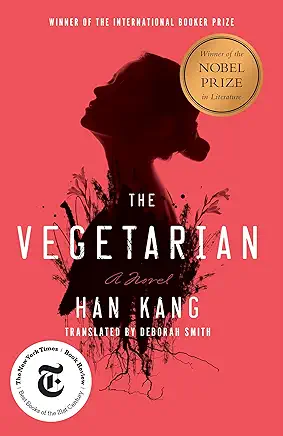
I had a difficult time processing my thoughts after reading The Vegetarian. In a 2016 interview in LitHub, Han Kang states that she sees the world as “mingled violence and beauty.” She also says that she is “questioning human violence and the (im)possibility of innocence; defining sanity and madness; the (im)possibility of understanding others…” The interview helped me understand why Han Kang won the Nobel Prize for Literature and this book’s incomprehensible elements.
Han divided the novel into three parts, perhaps a triptych, which allows us to explore the main character, Yeong-hye, from three perspectives: Mr. Cheong, her husband; her brother-in-law, who is nameless; and Yeong-hye’s sister, In-hye, the brother-in-law’s wife. In the first part, Yeong-hye declares to her husband that because of a dream, she no longer wants to eat meat and is becoming a vegetarian. She violently disposes of all the meat in their home and changes her eating habits and thus, her lifestyle. Mr. Cheong is not only incredulous but downright angry. He not only solicits her family to rebuke her, but he determines that his marital right is to abuse her, rape her and further destroy her dignity since she is making choices that defy her upbringing and her husband’s expectations.
The second section is from the perspective of Yeong-hye’s brother-in-law. The brother-in-law does not contribute financially to his household since he is a video artist developing his artistic talents. He capitalizes on Yeong-hye’s vegetarianism and isolation from her husband and family to create videos that are unsettling to read, yet develop one of the central themes related to Yeong-hye’s individualism or mental illness, depending on how one interprets her actions. Readers can consider some timeless themes while reading the brother-in-law’s point of view. Is being a nonconformist amoral? Does every human being have a right to use their body as they see fit, even if actions are unusual? How much do societal expectations matter?
In the third part, from Yeong-hye’s sister, In-hye’s point of view, we finally get a female perspective. In-hye begins her story segment with a traditional view of marriage and rearing children, and attempts to remediate her sister. Then, as she reflects on Yeong-hye’s interactions with both her husband and In-hye’s, she challenges some of her assumptions and begins to relate to Yeong-hye and the establishment with fresher perspectives.
Although Yeon-hye’s wishes are apparent throughout the novel, they are suppressed and devalued by the men in her life and society. As the plot develops, she takes drastic measures to control her body and not yield to others’ wishes. It concerns much more than a decision not to eat meat. The reader can decide whether she is being persecuted or if her bizarre behaviors require treatment.


